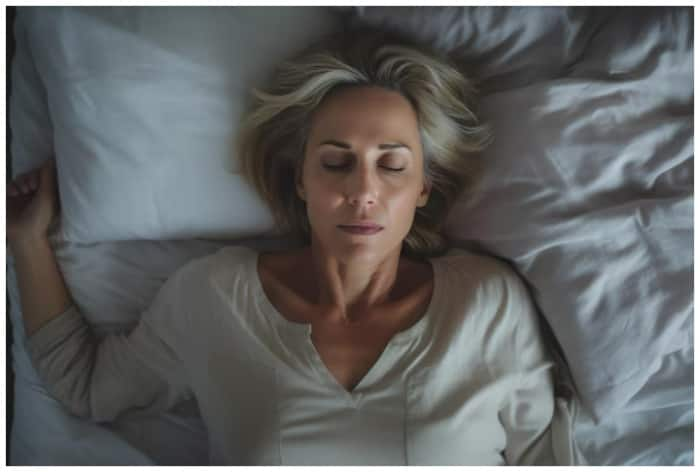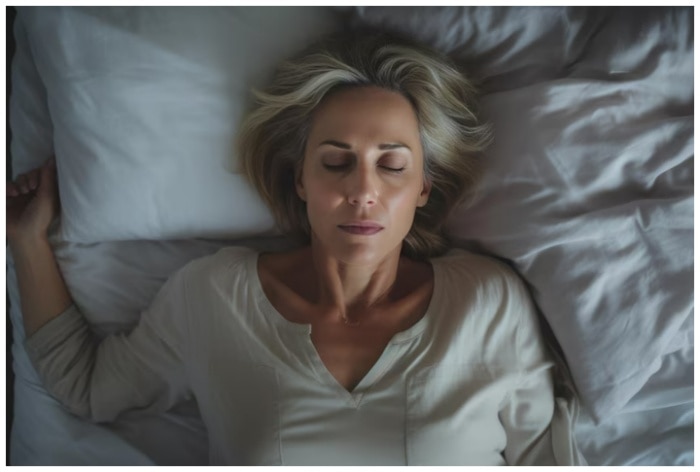Once women hit the menopause mark, a lot of things start to change physiologically. Expert reveals how it may affect sleep cycle for women as well.

For any woman, it is essential to understand how the menopause impacts her sleep patterns and quality. Women typically experience menopause between the ages of 45 and 55 and it is a normal biological aging process that causes a range of hormonal changes. When a woman does not experience menstruation for 12 months, she is considered to be in menopause.
Relation Between Sleep Deprivation and Menopause
The beginning of menopause leads to sleep deprivation which has both short-and long-term consequences. In order to better comprehend the sleep and menopause connection, India.com got in touch with Dr. Pavny Chawla, MBBS, MD (Respiratory and Sleep Medicine), Artemis Hospital, Gurugram. Dr. Chawla further elaborated on the connection and how to manage sleep issues.
Some of the short-term effects include depression, exhaustion, difficulty with work life balance and potential neurocognitive difficulties. On the other hand, long-term effects impact the cardiometabolic system resulting in arrhythmias, hypertension, type 2 diabetes and heart failure.
Diverse vasomotor symptoms, such as hot flushes, nocturnal sweats, palpitations, memory loss, irritation, and disturbed sleep, are characteristic of this premenopausal to menopausal transitional period. The protective effects of progesterone and estrogen diminish with time which leads to sleep disordered breathing and sleep apneas.
Sleep disorders such as obstructive sleep apnea(OSA)occurs when the tone of the upper airways decreases due to a reduced levels of progesterone and estrogen levels in the blood, making them more collapsible while sleeping. Different forms of sleep disorders affect 35–65% of women in the early stages of menopause.
Sleep apnea is three times more common in post-menopausal women than it is in pre-menopausal women. Micro-awakenings occur when the brain activates due to decreased air entry into the lungs caused by the collapse of the upper airway resulting in hypoxia/ desaturation leading to sleep fragmentation.
Tips For Good Quality Sleep After You Hit Menopause
- Create Conducive Sleep Environment: Before going to bed, the bedroom needs to be dark, peaceful, and cool. Maintaining a tidy bedroom and using it exclusively for sleeping will help to promote better quality rest.
- Practice a sleeping schedule: Although it can seem appealing to stay up late throughout the workweek while making up for the lack of sleep on weekends, the transition into menopause disrupts circadian rhythms. A consistent sleep schedule is essential for obtaining restorative sleep.
- Keep your body temperature cool: In order to prevent hot flushes and night sweats, set the bedroom’s temperature to a low, relaxed degree. Pick cotton sheets instead of synthetic alternatives and consider taking a refreshing shower prior to bed.
- Recognising sleep disorders: A variety of symptoms can be present for sleep disorders, which are more common in women going through menopause. A sleep specialist can assess the condition of sleep on the basis of patient’s history, signs and symptoms. The available treatment options may vary as women’s symptoms differ from men’s symptoms and PAP therapy for them requires a customised algorithm.
There is a clear and ongoing connection between optimal health and happiness and getting adequate sleep. An individual should seek medical attention if they show symptoms of exhaustion disturbed sleep or excessive drowsiness during the day. It is imperative to have more awareness about your body and how it responds in different situations.

